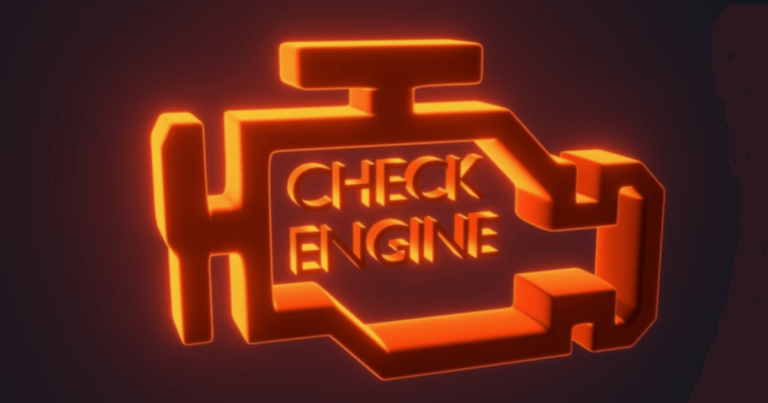Flashing Check Engine Light? Causes & Solutions
A flashing check engine light is one of the most serious warnings your vehicle can give you. Unlike a steady light which indicates a minor issue a blinking or flashing check engine light signals an urgent problem that needs immediate attention.
Ignoring it could lead to severe engine damage and expensive repairs. So, if you’re experiencing a check engine light flashing keep reading to understand its causes and how to fix it.
What Does a Flashing Check Engine Light Mean?
A flashing check engine light usually means there’s a misfire in the engine that’s severe enough to cause damage to the catalytic converter. The catalytic converter is responsible for reducing harmful emissions and a misfire can cause it to overheat and fail.
Unlike a steady check engine light which may point to minor issues like a loose gas cap or faulty oxygen sensor a flashing light should never be ignored.
Common Causes of a Flashing Check Engine Light
1. Engine Misfire
An engine misfire occurs when one or more cylinders fail to combust properly. This disrupts the air-fuel mixture, causing rough idling, loss of power and increased emissions.
Causes of an engine misfire:
- Faulty spark plugs
- Worn-out ignition coils
- Clogged fuel injectors
- Low fuel pressure
- Vacuum leaks
Solution: Replace worn spark plugs and ignition coils, clean fuel injectors and check for vacuum leaks.
2. Bad Ignition Coils
Ignition coils convert battery voltage into the high voltage needed to create a spark in the engine’s cylinders. A failing ignition coil can result in weak or no spark, leading to misfires.
Symptoms of failing ignition coils:
- Car shaking during acceleration
- Poor fuel efficiency
- Trouble starting
Solution: Have the ignition coils tested and replace any that are malfunctioning.
3. Clogged or Faulty Fuel Injectors
Fuel injectors deliver the correct amount of fuel into the engine. When they become clogged or faulty, the engine may not receive enough fuel, leading to incomplete combustion and misfires.
Signs of bad fuel injectors:
- Rough idling
- Engine stalling
- Poor fuel economy
Solution: Use a fuel injector cleaner or have the injectors professionally cleaned or replaced.
4. Faulty Oxygen Sensor
The oxygen sensor monitors the air-fuel ratio. A malfunctioning oxygen sensor can cause incorrect fuel mixture calculations leading to misfires.
Symptoms:
- Decreased fuel efficiency
- Increased emissions
- Rough engine performance
Solution: Replace the faulty oxygen sensor.
5. Catalytic Converter Damage
A misfiring engine can overheat the catalytic converter causing it to fail. If left untreated a failing catalytic converter can lead to reduced engine performance and increased emissions.
Symptoms of a failing catalytic converter:
- Rotten egg smell (sulfur)
- Poor acceleration
- Excessive heat under the vehicle
Solution: Replace the catalytic converter if it is damaged.
6. Vacuum Leaks
Vacuum leaks allow unmetered air to enter the engine leading to an improper air-fuel mixture and misfires.
Signs of a vacuum leak:
- Hissing noise from the engine bay
- Rough idle
- High RPMs at idle
Solution: Inspect and replace cracked or disconnected vacuum hoses.
7. Mass Air Flow (MAF) Sensor Failure
The MAF sensor measures the amount of air entering the engine. A failing MAF sensor can cause the engine to run too rich or too lean, leading to misfires.
Symptoms:
- Hesitation during acceleration
- Stalling
- Poor fuel economy
Solution: Clean or replace the MAF sensor.
8. Low Fuel Pressure
Insufficient fuel pressure can cause lean misfires. This can happen due to a failing fuel pump, clogged fuel filter, or bad fuel pressure regulator.
Symptoms of low fuel pressure:
- Hard starting
- Power loss
- Engine stalling under load
Solution: Test the fuel pump and replace the fuel filter if necessary.
9. EGR Valve Malfunction
The Exhaust Gas Recirculation (EGR) valve reduces emissions by recirculating exhaust gases. A faulty EGR valve can cause rough idling and misfires.
Symptoms:
- Poor acceleration
- Stalling
- Increased emissions
Solution: Clean or replace the EGR valve.
Preventing Future Check Engine Light Issues
To avoid dealing with a flashing check engine light follow these maintenance tips:
- Regular Tune-ups: Replace spark plugs, ignition coils, and fuel filters as recommended.
- Use Quality Fuel: Avoid low-quality gas that can clog injectors.
- Check Your Oil Levels: Low oil can affect engine performance.
- Inspect Hoses and Belts: Replace cracked or worn vacuum hoses.
- Monitor Fuel Economy: Sudden drops in mileage can indicate problems.
Conclusion
A flashing check engine light should never be ignored. It usually means a severe engine misfire that can damage your catalytic converter and lead to costly repairs. By understanding the common causes and taking immediate action, you can prevent further engine damage and keep your vehicle running smoothly.
If your check engine light flashing follow the steps outlined in this guide and seek professional help when needed. Staying proactive with maintenance will save you from unexpected breakdowns and expensive fixes.





